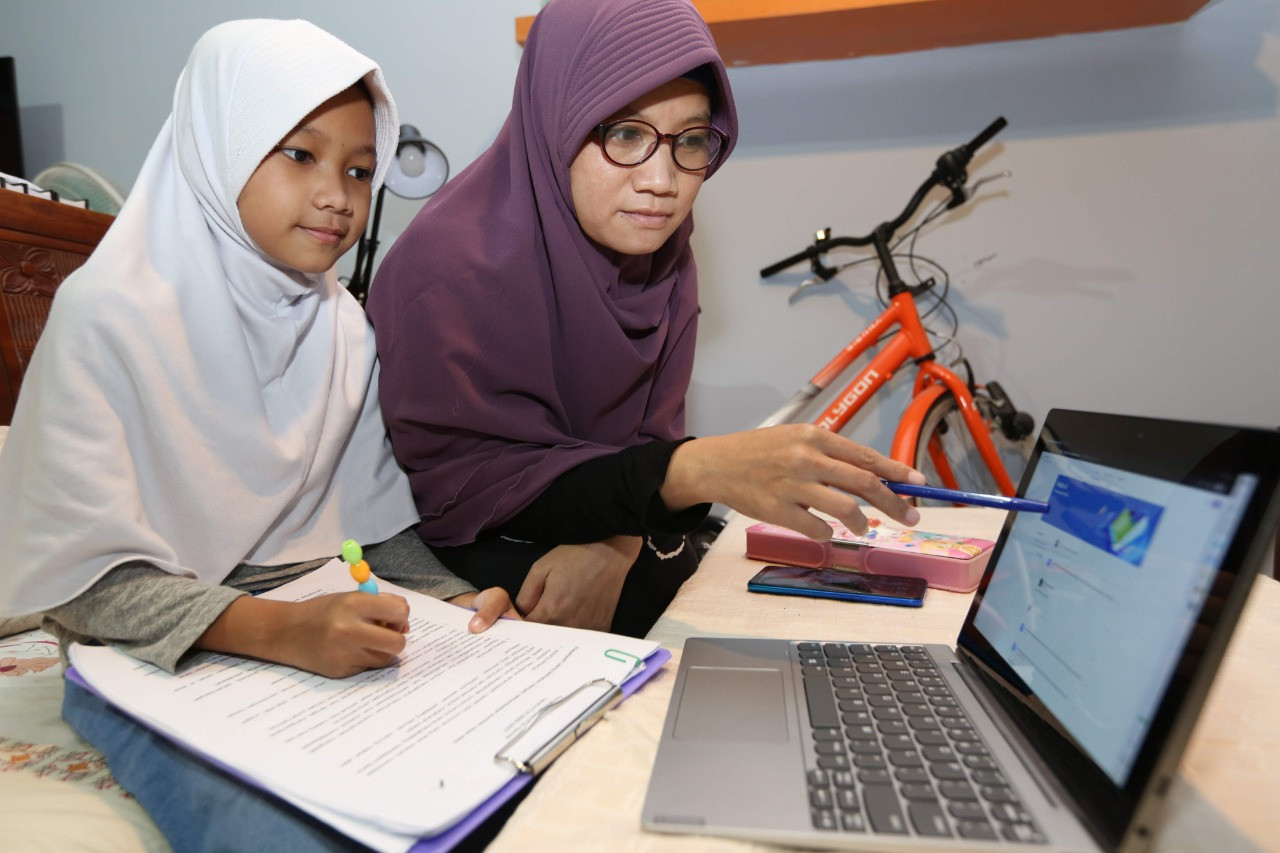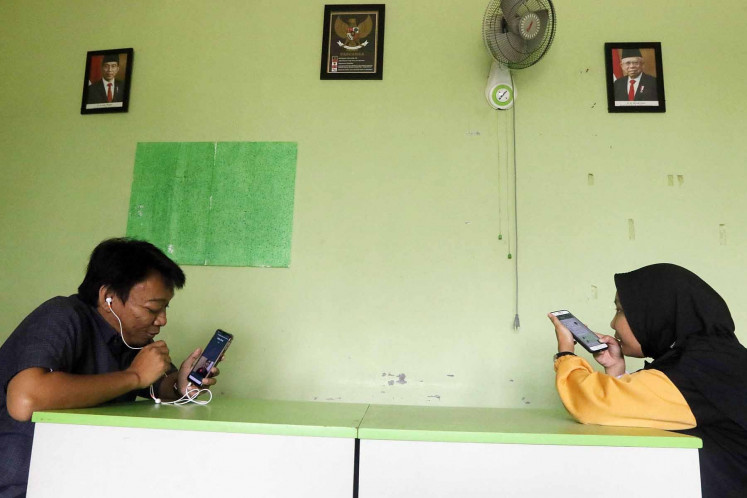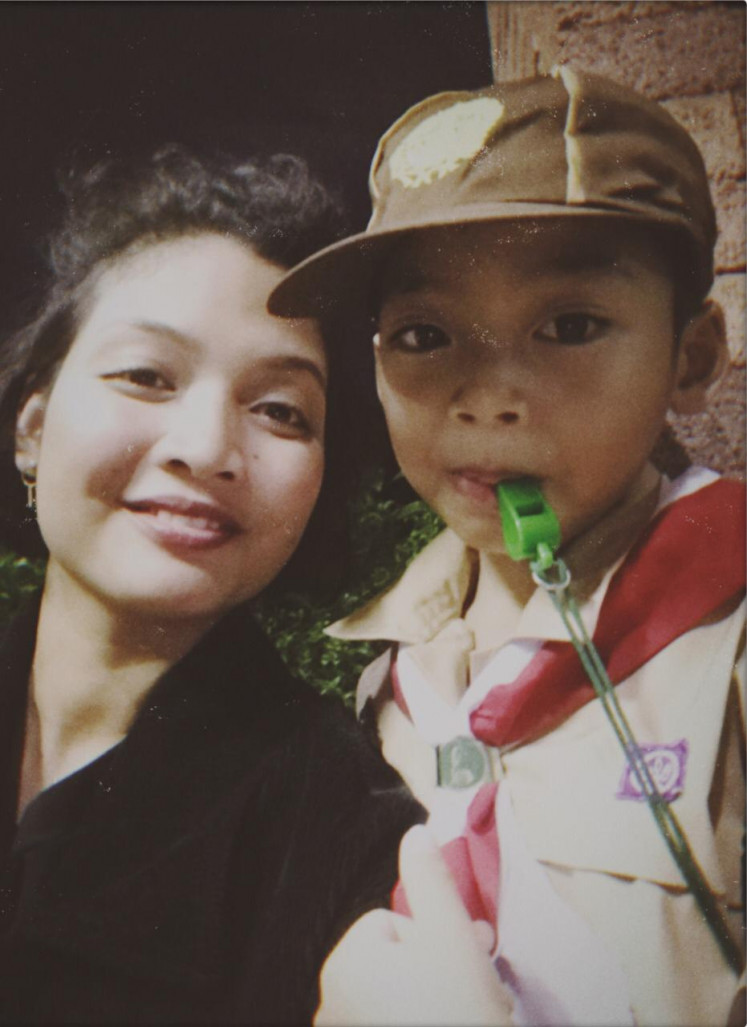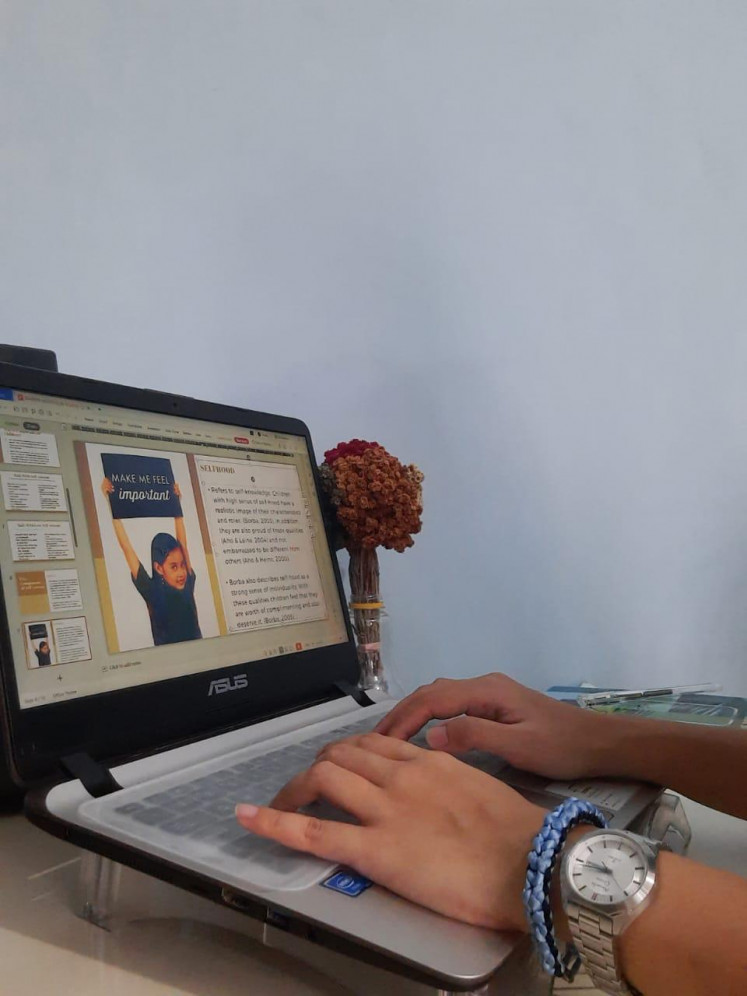Popular Reads
Top Results
Can't find what you're looking for?
View all search resultsPopular Reads
Top Results
Can't find what you're looking for?
View all search resultsUnpraised heroes: Educators do their best with challenge of online classes
Children and parents in Indonesia are having a hard time with online learning, but so are the teachers, and there’s not much sympathy and support for them.
Change text size
Gift Premium Articles
to Anyone
Yudhistira Agato
(Contributor/Jakarta)
Via Irianti’s day starts early and finishes late. In the morning, she would immediately get on her laptop, and enter the group chat with her fellow workers about their plan for the day. She then prepares her zoom classes and sets personalized tasks for each student she’s responsible for. After lunch time, there’s meetings with the teacher coordinator and some administration work. From late afternoon until late at night, Via checks the students’ video assignment, leaves comments and talks to the parents about their kids’ struggles.
For the first few months of online learning, this was a normal day for Via Irianti, a 30-year-old nursery school teacher in Yogyakarta, Central Java, and possibly for many other educators all over the country. Since COVID-19 hit Indonesia back in March 2020, the government has been forced to close schools and universities to limit physical social interaction, practically shifting all schooling activities online.
It was a big adjustment for everyone involved, but teachers, in particular, were forced to adapt quickly to this new environment. Via recalls that the first three months were the toughest. “It was like starting everything all over again,” She says. “We would work from home until midnight.”
Ben, a 25-year-old teacher at a private primary school in Yogyakarta who chose not to disclose his name, agrees that online learning requires more preparation time. “It’s not only about the content,” he said. “Now teachers also have to work on the delivery medium, whether it’s video or slides or pictures.”
Biology teacher Wahyu Adi Prasetyo (left) and his colleague, English Rantiyani, an English teacher, teach online classes in South Tangerang, Banten, on Aug. 10. Without large internet data packages, some teachers have been forced to reduce the duration of their online classes. (JP/Dhoni Setiawan)Educators also had to go above and beyond their usual effort to maintain students’ interest, especially those who teach younger kids. Mellisa (not her real name), a 21-year-old English teacher at a private preschool in Cibinong, Bogor, claims that she would often dance and sing just to get her students to look at the screen. Via, meanwhile, often pretends to be a master of a variety show and sometimes emulates the act of a mukbanger (food vloggers who eat mass amounts of food) to keep her students engaged.
Tech trouble
Initially, many educators struggled to adapt to technology-based learning. This especially rings true for older teachers who have spent dozens of years teaching face-to-face in classrooms.
Siti Maria Rizana, a 50-year-old teacher at an academic tutorial center in Bintaro, South Jakarta, admits that she and her fellow teachers panicked at the beginning of distance learning. Through the screen, she found it difficult to observe the students doing their work. “I teach math, and even offline so many kids struggle with the lesson,” she said.
“It also doesn’t help that most of our teachers are gaptek (clueless with technology), so even using something like Zoom to teach is a struggle,” Siti added, laughing. “We all needed a long time, myself included, to learn how to use such applications.”
Difficult parent-teacher dynamic
Elisabeth Hedytia Nimas, a working single mother of a fourth-grader, said early on, she had to accompany her 9-year-old son during his school zoom sessions pretty much from 7 a.m. to 3 p.m. with only a few snackbreaks in between. “Every time my son looked like he was daydreaming, I would nudge or call him,” she said, “and I would do this with a laptop on my lap and having zoom meetings with my boss.”
Hedytia eventually would have to make occasional visits to her office, leaving her son alone to deal with his study. At times, he didn’t do his homework and Hedytia would have to check on them late at night after she got home. “It’s painful, but I had no choice,” she said, “otherwise he would be left behind in school, and there’s nobody else that could help him.”
The role of parents in their children’s’ education has never been more important, but most don’t have the time to become the “second teacher” at home. Some also start to question the teachers and perceive them as not doing enough.
Elisabeth Hedytia Nimas and her 9-year old son. Like many other parents, she’s had to juggle working and staying by her son’s side during his online school sessions from 7.00 am to 15.00 pm with only a few breaks in between. (Courtesy of Elisabeth Hedytia Nimas/Elisabeth Hedytia Nimas)“What do the teachers do exactly? I mean, it’s still the parents who take care of the kids’ education anyway,” said Via, passing on the type of remarks she and her colleagues would hear from some parents.
Via argued that many educators, herself included, had felt an identity crisis of sorts in the beginning of the pandemic, even though they had to work hard and long hours just to keep things afloat. Leni (not her real name), a 26-year-old first-grade teacher in Sleman, Yogyakarta, said she had to be ready at all times—even outside of working hours—to respond to messages from students or parents, to the point that she lacked quality sleeping time.
It’s a delicate situation where both parents and teachers have to make sacrifices for the sake of the child’s learning growth. Muhammad Fahri, father to a 7-year-old daughter, thinks that no party is to be blamed. “Both are in a difficult situation,” he said. “The teachers weren’t trained to teach online, and parents certainly were not ready to become home teachers for months.”
Financially and emotionally draining
Aside from finding their way in the new landscape of online learning, many educators also had to settle for lower salaries due to the pandemic. Nurul Uthami, a 23-year-old teacher at a special-needs school in Tangerang, said her salary had been slashed by a good amount since many parents had difficulties paying for their children’s tuition. “Last year, we had a huge cut in our salary, and there’s nothing we could do,” she said. “Starting this year, we didn’t even get the internet quota subsidy, who knows why?”
It’s a low blow considering most educators in Indonesia don’t make much to begin with. Most public teachers earn no more than the country’s minimum monthly wage, and some part-time teachers make as little as Rp500.000 to Rp700.000 (US$35.09 to $49.12) a month.
Many teachers also feel that they are not getting enough support. Reni, a 37-year-old science teacher at a private school in Surabaya who doesn’t want to use her real name, said she was stressed out and her productivity had gone down drastically.
“The school didn’t teach us teachers how to handle working from home,” she said. “Their awareness regarding the importance of mental health is still low, so I started going to a psychologist by myself and rearranged my daily schedule to get better.”
Via Iriyanti, a nursery school teacher, said that the first 3 months of online classes were the hardest and that she and her fellow teachers would work until midnight. (Courtesy of Via Iriyanti/Via Iriyanti)Nobody, perhaps, knows better what teachers have been going through than Johnson (not his real name), the principal at an international school in Jakarta.
He argues that teachers are losing their personal workspace in class and are being watched by more pairs of eyes than before, putting a burden on their mental health. At the same time, they are still being pushed to fulfill the curriculum, getting students to learn and doing administrative work with very thin boundaries between work and home.
“It’s very stressful,” he said. “Teachers are the frontline of the school, and thus, they need all the support they can get.”













